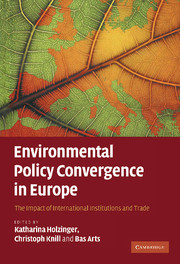Book contents
- Frontmatter
- Contents
- List of figures
- List of tables
- List of contributors
- Preface
- List of abbreviations
- 1 Introduction
- 2 State of the art – conceptualising environmental policy convergence
- 3 Theoretical framework: causal factors and convergence expectations
- 4 Research design, variables and data
- 5 Degree and direction of environmental policy convergence: analysis of aggregate data
- 6 The pair approach: what causes convergence of environmental policies?
- 7 The gap approach: what affects the direction of environmental policy convergence?
- 8 Conclusion
- Annex
- References
- Index
8 - Conclusion
Published online by Cambridge University Press: 22 September 2009
- Frontmatter
- Contents
- List of figures
- List of tables
- List of contributors
- Preface
- List of abbreviations
- 1 Introduction
- 2 State of the art – conceptualising environmental policy convergence
- 3 Theoretical framework: causal factors and convergence expectations
- 4 Research design, variables and data
- 5 Degree and direction of environmental policy convergence: analysis of aggregate data
- 6 The pair approach: what causes convergence of environmental policies?
- 7 The gap approach: what affects the direction of environmental policy convergence?
- 8 Conclusion
- Annex
- References
- Index
Summary
INTRODUCTION
The central objective of this book was to advance our theoretical and empirical understanding of causes and conditions of cross‐national policy convergence. In theoretical terms, we were especially interested in the extent to which growing economic and institutional interlinkages between nation states – developments that are usually associated with catchwords such as globalisation and Europeanisation – constitute major driving forces of cross‐national policy convergence. In this regard, we studied the impact of three central convergence mechanisms, namely, international harmonisation, regulatory competition and transnational communication.
In empirical terms, we analysed the relevance of these factors for the area of environmental policy. More specifically, we were especially interested in two research questions. On the one hand, we studied the extent to which the policies of the countries under study actually became similar over time. On the other hand, we focused on the direction of convergence; i.e., the question whether potential similarity increases coincide with often‐discussed races to the top or bottom of national environmental policies. To answer these questions, we analysed the development of forty different environmental policies of twenty‐four countries over a period of thirty years (1970 until 2000).
In addressing these theoretical and empirical questions, our study not only indicates several new insights and innovations, but also points to new and interesting questions for future research. Both aspects, innovations and avenues for future research, will be presented in more detail in the following sections.
- Type
- Chapter
- Information
- Environmental Policy Convergence in EuropeThe Impact of International Institutions and Trade, pp. 227 - 232Publisher: Cambridge University PressPrint publication year: 2008
- 1
- Cited by

